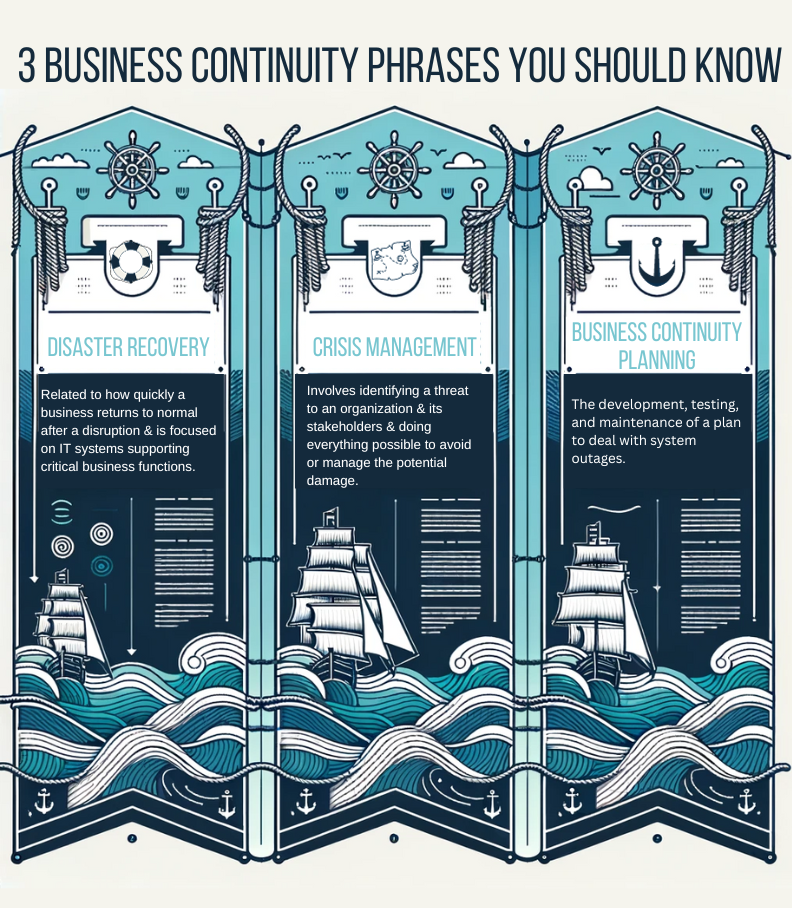Picture this: You’re sitting comfortably in your plush, office chair and all is well in the corporate world. Suddenly, a chain reaction of unexpected events unfolds – a natural disaster hits, a cyber attack occurs, or there’s a significant hitch with your supply chain. What would you do? Would your business be able to weather the storm and quickly resume operations post-crisis?
In this ever-changing and unpredictable world, these are not merely theoretical situations, but very real potential threats that businesses should be prepared for. This is where Business Continuity Management (BCM) comes into play. BCM involves detailed planning and preparation to ensure that an organization can continue to operate in case of serious incidents or disasters and is able to recover to an operational state within a reasonably short period.
Flagship SG, a leading provider of managed IT services and IT infrastructure solutions, fully understands the significance of BCM. We have successfully harnessed our knowledge and expertise in technology infrastructure, business analytics, and cloud and managed services to provide businesses of all sizes with top-tier BCM support. A partnership with us means securing the future and integrity of your business operations, and we’d say that’s an investment worth making.
Business Continuity Management Explained
BCM is about being prepared – it’s about creating and implementing a plan that ensures your business’s critical operations continue to function during a crisis and resume as quickly as possible post-disruption.
Let’s pause for a moment and understand some of the terms involved in BCM.
- “Disaster recovery” is related to how quickly a business returns to normal after a disruption and is focused on IT systems supporting critical business functions.
- “Crisis management” involves identifying a threat to an organization and its stakeholders and doing everything possible to avoid or manage the potential damage.
- “Business Continuity Planning” is the development, testing, and maintenance of a plan to deal with system outages.

Now, you must be wondering, “Why does BCM matter so much?” Consider a major disaster, like an earthquake or a pandemic, or even a cyber-attack. Without a solid continuity plan in place, such events can cause massive damage to a company’s infrastructure, paving the way for colossal loss in revenue and customer trust.
For instance, a natural disaster could lead to a breakdown of your on-site IT infrastructure, causing you to lose valuable data. A cyber-attack could result in compromised customer information, leading to reputational damage and potential legal penalties. The potential impact of such disruptions to normal operations could be catastrophic, if not managed properly.
And here lies the significance of BCM – it’s not about preventing crises but managing them. It ensures that even during the darkest times, the light at the end of the tunnel is never switched off for your business.
Business Continuity Management vs. Business as Usual
Every business owner likes a smooth sailing ship. Normal operations where everything works as it should – employee tasks flowing seamlessly, supply chains operating flawlessly, and customers being satisfied continuously. However, disruptions, disasters, or crises are not a matter of if but when, and they can throw your perfectly balanced boat into a sea of chaos.
The focus of BCM is not merely on getting everything back to normal post-crisis. Instead, it advocates for a holistic management process that involves a systematic approach to creating prevention and recovery systems from potential threats to an organization. It means developing the organizational ability to adapt to disruptions while maintaining continuous business operations, and safeguarding people and assets in the process.
One key aspect of effective crisis management, and a component of BCM, is clear and consistent crisis communication. In a situation of chaos and confusion, maintaining open lines of communication can make all the difference in effective response and ensure a quick return to normal operations.
In essence, BCM is like a superhero cape for your business — a protective shield to keep your business afloat when the waters get rough.
The Role of Flagship SG in Business Continuity Management
Your success lies at the heart of our mission here at Flagship SG. We not only value your business, but we also pay paramount importance to its continuity in times of crisis. This is why we specialize in providing advanced solutions and support for business continuity management.
Armed with deep-seated knowledge and expertise in technology infrastructure, business analytics, cloud, and managed services, Flagship SG is well-equipped to guide your company through the maze of challenges that threaten business continuity.
For instance, amid potential threats such as cyber-attacks or natural disasters, we leverage our managed IT services to reinforce the security of your digital assets. We ensure your data is not only safeguarded but also capable of being quickly restored, aiding disaster recovery.
Moreover, our suite of IBM solutions makes us stand out in our industry. These best-in-class services contribute to maintaining an uninterrupted flow of your critical business functions, offering resilience in the face of business disruptions.
But we don’t stop at merely proposing solutions. Our commitment to BCM involves a hands-on approach. We work closely with each of our clients to understand their unique requirements and potential vulnerabilities. Only then do we devise a customized, strategic continuity plan that factors in every aspect of the firm’s operations.
We firmly believe that in an era where risks lurk around every corner, it’s essential to walk the path of preparedness. With us by your side, you’re not only investing in solutions but also enrolling for peace of mind.
Conclusion
The world of business is not devoid of crises, but it’s how you manage them that makes the difference. There’s a saying – ‘fail to plan, plan to fail,’ and the value of planning has never been more accurate than in the realm of business continuity management.
Knowledge, they say, is power. Knowing about business continuity management (BCM) provides you the strategic muscle to arm your business against potential threats. Whether it’s dealing with a surge of demand, patching up disruptions in supply chains, warding off cyber attacks, or figuring out how to keep your business running in the midst of a pandemic, BCM provides the roadmap.
Flagship SG helps businesses traverse down this road with ease and assurance. We offer solutions designed to limit the extent of system downtime and prevent setbacks in your operational productivity. But more than our vast array of services, we stand by our commitment to handhold you through challenging times, using our technology and expertise to steer you towards success.
As we conclude this insightful journey into the world of BCM, it would be worth reflecting on your own business. Are your business operations immune to disruptions? How would a sudden crisis impact your bottom line? If these questions stir concern, maybe it’s time to consider integrating business continuity management into your strategic plan. Because when the waters get rough, Flagship SG is the lifeboat you can count on.
Remember, an effective BCM strategy isn’t a luxury – it’s a necessity. And we at Flagship SG, are here to help you embrace that necessity, safeguarding both your present and future in the realm of business.
Schedule a Meeting with the Flagship SG team
This blog was reviewed for accuracy by:
Ed Turetsky | Senior Infralytics Architect Flagship SG
Ed Turetsky is a technology industry veteran with several decades of experience in the infrastructure space. He has deep expertise in servers, both x86 and Power; storage, block, object and file; and cloud. Over the years, he has been utilized as a subject matter expert by IBM and Lenovo to participate in writing certification/badge exams and quizzes for processors and storage systems along with their respective operating systems. Lately, his focus has shifted to providing SaaS and other cloud-based solutions as well as security solutions for data, infrastructure, and people. From an enterprise perspective, he has been TOGAF and ITIL certified. Customers value his broad knowledge across the technology space in order to provide solutions to their business needs. He takes complex issues and provides executives with the ability to understand the issue at hand and how to go about resolving it.

